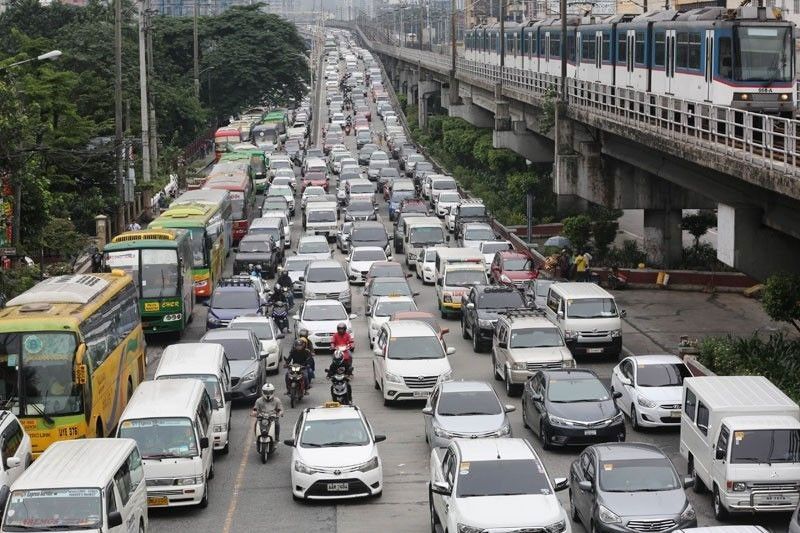Filipinos lose 9 to 15 years of their lives sitting in traffic — urban planner

MANILA, Philippines — Filipinos sit through a cumulative nine years of their working prime sitting in traffic, urban planning specialist Felino "Jun" Palafox Jr. said on Monday
"[I]f you have 40 years of economic life with the five to six hours a day [of commuting,] you would have wasted 28,000 to 40,000 hours, that's at least nine to fifteen years taken from your life," Palafox said on ANC's "Early Edition".
Data from the World Health Organization published in 2018 said that the total life expectancy in the Philippines for both men and women is 69.3 years.
The Boston Consulting Group revealed in 2017 that Manila's traffic congestion cost motorists an average of over an hour lost in traffic every day, putting it at third worst in Southeast Asia.
Similarly, the Japan International Cooperation Agency said in a 2018 study that traffic now costs the Philippines P3.5 billion in "lost opportunities" daily. The amount is expected to triple in number by the year 2030.
Band-aid solutions
Of the Duterte administration's heightened push for infrastructure projects, Palafox said that, "I think all of these recommendations will alleviate the situation but it will not solve the problem."
"Traffic management is not enough," Palafox asserted of the many proposed solutions relating to congestion. "How do you manage lack of roads [and] lack of transport? We start with urban planning and land use, because land use is the demand side of traffic."
Touted as the Build, Build, Build program, the government's vigor for infrastructural progress was among the central tenets of Duterte's campaign when the former Davao City mayor was running for his current post. Among the listed plans for the program is the first-ever subway in Metro Manila, which is scheduled to be fully operational by 2025.
The urban planner emphasized the need for balance in planning.
Imbalance in jobs and housing
In particular, he also mentioned the statistic that the Makati central business district, where the daytime population is eleven times its population at night, is surrounded by low-density and expensive housing. As a result, its employees and "even executives are priced out of the housing stock," which in itself leads to longer commutes. He added that the business district increased its density by four times its size, further worsening the traffic generation in the city.
Within the borders of Makati City are numerous gated communities and high-end subdivisions including Forbes Park and Magallanes Village. It was identified in a 2015 Lamudi Philippines report as the most expensive housing market in the country with the average price for a house and lot at almost P207.2 million.
The city's traffic generation, he said, came as a result of the existing imbalance between jobs and housing.
He identified government and leadership usage of public transportation as one indicator of a first-world country. Consequently, he said that, "We are still a third world country because one of the reasons is our leaders, both government and business, still take their cars, not the public transit."
Earlier in the interview, Palafox cited four projects that should have been accomplished much earlier, specifically the proposal of eight light rail transit lines which should have been completed by 1992, the subway system proposed in 1971, and Circumferential Road 6 proposed in 1945.
Do nothing or do little
According to Palafox, the mass transportation crisis faced by commuters today was predicted as early as 43 years ago, yet past administrations caused delays due to the muddling presence of politics in urban planning.
Palafox said that work on a number of infrastructure projects only officially began under the Duterte administration despite all having been proposed decades ago. Asked why these delays happened, he said there was "too much politics [and] lack of continuity and institution memory."
"For the past few years, it was 'do nothing or do little,' [and] that's why we have catastrophic traffic right now," he said.
"They ignore previous planning initiatives, and so on. It's short-term and opportunistic, it's not long-term and visionary."
He pointed to the 1976 World-Bank funded Manila Development Planning Project where many recommendations had already been brought up.
World Bank's report on the project particularly cites urban transport among Metro Manila's most pressing concerns and goes on to expound say that "chronic congestion has become a common condition because of population growth and a rapid growth in the number of private passenger vehicles."
The Palafox interview comes as the latest amidst the ongoing mass transportation crisis.
Metro Manila's traffic congestion problem was most recently thrust into the spotlight after presidential spokesperson Salvador Panelo accepted the "challenge" from progressive groups to commute to Malacañang as a response to his assertion that there was no transportation crisis.
- Latest
- Trending






























